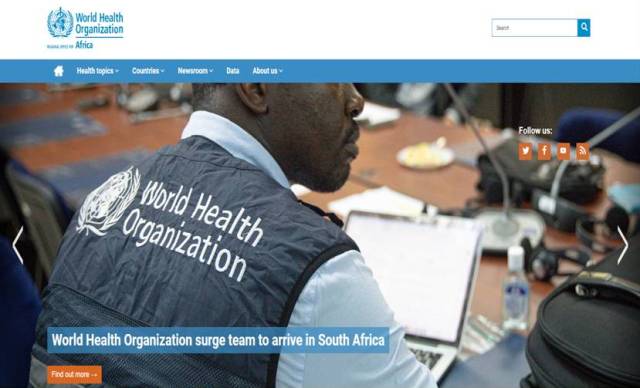 The World Health Organisation outlines its work in Africa on its web pages.
The World Health Organisation outlines its work in Africa on its web pages.
[This is an excerpt from an article appearing in the current edition of The Round Table: The Commonwealth Journal of International Affairs. Opinion articles do not reflect the position of the Round Table Editorial Board.]
The Covid-19 pandemic has had massive consequences on most countries on our planet. While the spread of the virus follows different trajectories at different times, most governments have resorted to similar strategies in the management of its risks. Even affluent societies and (what is left of) welfare states in industrial countries have found it difficult to cope. Problems multiplied in countries with a shortage of respirators, intensive care units (ICUs) or isolation wards for the ordinary population.
Southern African governments observed the recommendations of the World Health Organisation (WHO). Namibia declared a six-month-long state of emergency on 17 March 2020 with strict lockdown regulations for the first 38 days. South Africa proclaimed a State of Disaster, with an initial 21-day lockdown from 27 March. In both countries this included a ban on liquor and cigarettes sales, which created a thriving illegal market and loss of tax revenue. While the regulations were gradually eased, both countries remain under rigorous measures to contain the infection rates. The peak of the pandemic is only expected around July/August.
By following a “one-size-fits-all” approach, both governments imposed a strictly regulated and controlled regime on all people alike. But their population’s living conditions differ dramatically. Each being among the most unequal societies in the world, the economic and social disparities are exceptional even in “ordinary” times. Private health care provisions have been serving a privileged minority. Public health facilities in contrast lack infrastructure, staff and equipment (including sufficient medical supplies). The unemployment figures hovered before the lockdown between 30 and 40% (depending on definition) and were much higher in the younger age-groups. If those in formal employment were alone counted, figures would be considerably higher.
In Namibia, some 40% of the people live in “informal settlements”, a euphemism for shacks with neither sanitation nor running water. The number of people in the urban townships and rural areas under similar conditions in South Africa should not differ much. Basic hygiene can hardly be maintained with queues for water collection, shared toilets, and several people living in one room. In contrast, the elites enjoy the privileges of residential areas with gardens and pools. They can afford social distancing and homes with full fridges, internet access and other entertainment facilities. They have secure employment, savings, and all sorts of comfort. The lockdown has, interestingly, become a cause of frustration for some for being denied the normal recreational outdoor activities – surfers in South Africa demonstrated against not being allowed access to beaches, calling it a violation of their civil liberties.
Township realities are different. The lockdown has denied people the mobility required to eke out a bare living. Informal trading, street hawking, newspaper vending and other activities (including searching the dustbins of the rich for leftovers) are a matter of daily survival. Closed schools (where children often otherwise got their only proper daily meal) added to the misery. People fear death from hunger more than from Covid-19.
Henning Melber is Extraordinary Professor, University of Pretoria.



